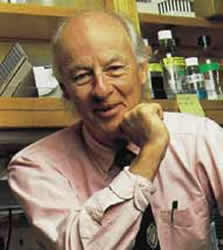

|

|
IN MEMORIAM
Richard Campbell Strohman
Professor of Molecular and Cell Biology, Emeritus
UC Berkeley
1927 – 2009
Richard Campbell Strohman was born in Brooklyn, New York, on May 5, 1927. After a long and productive academic life in zoology at the University of California, Berkeley, from his start as assistant professor in 1958 to his retirement as professor in 1991 and postretirement teaching and writing, he passed away on July 4, 2009, in Sonoma, California, from complications of Alzheimer's disease.
Dick Strohman served in the armed forces immediately after World War II, then matriculated at Columbia University with the B.S. degree in 1952, and the Ph.D. in 1958. He was a graduate student of Teru Hayashi whose laboratory studied muscle physiology and the biochemistry of contractile proteins found in muscle. Dick joined the Department of Zoology at UC Berkeley in 1958 as assistant professor and progressed through the ranks, becoming full professor in 1971. When the departments in the biological sciences at Berkeley were reorganized in 1989-1990, Strohman joined the Division of Cell and Developmental Biology of the fledgling Department of Molecular and Cell Biology. During his entire career he continued to investigate the development and function of muscle. His lab was one of the few that pioneered the use of tissue culture studies of developing muscle, opening the door for a flourishing community of researchers working on normal muscle development in the embryo. This work led to studies of abnormal development, especially muscular dystrophy. This work was done largely before the advent of recombinant DNA-based molecular biology, and involved sophisticated biochemical and embryological techniques.
Strohman’s early work on the biochemistry of muscle proteins was followed by work on the molecular basis of specialization of muscle cells from unspecialized precursor cells as they developed during culture in vitro. He later went on to apply these techniques and the insights gained to muscle tissue in different physiological states, and importantly, to muscles from dystrophic mice, which were used as models of the genetic disease muscular dystrophy. He was one of the pioneers who identified and underlined the importance of so-called "growth factors," and showed that fibroblast growth factor (FGF) was crucial for muscle differentiation.
During this period of intense study of muscle development, Strohman trained a large number of graduate students and postdoctoral fellows, who have gone on to make substantial contributions to our understanding of muscle biology. He was a warm, caring mentor, and his students often remarked how they valued Strohman's guidance and personal concern.
Strohman cared deeply about undergraduate education. He taught courses in various aspects of cell biology during his entire career, and helped shape, and then direct, the Health and Medical Sciences Program at Berkeley from 1976 to 1980. This program coordinated basic science training on the Berkeley campus with clinical work leading to the M.D. at the University of California, San Francisco, campus. In the 1980s, and after his retirement in 1991, Strohman was active in teaching innovative undergraduate courses about the interface between biology and medicine, including a course entitled The Biology of Human Potential designed for non-majors, and a course entitled Biology and Medicine for majors. After his retirement and as late as the spring semester of 2008, he taught freshman seminar courses for quite a few years.
Strohman was active in department, campus, and professional affairs. In addition to his service as director of the Health Sciences Program, he was chair of the Department of Zoology from 1973 to 1976. He was active in the National Dystrophy Association, serving on its board from 1978 to 1989. He was research director of this association in 1990.
Strohman was well known for his involvement in political activities, playing a sustained and passionate role in the "free speech" and anti-war movements on campus in the late 1960s and early 1970s. He was a member of the Faculty Peace Committee, which opposed the Vietnam war, and a member of Faculty for Social Responsibility, which opposed military operations in Central America in the 1980s. He was an early advocate of dropping "man" from words like "chairman," and this prompted someone to rewrite his name on his office door card as "Strohperson," and so it remained for some time.
In some curious way this passion was transferred in later years to a sustained concern with what Dick perceived as the overemphasis of a connection between genes and disease. He was an early advocate of seeing a bigger picture, and of looking at health and treatment as a complex landscape inhabited by many genes, by the environment, by nongenetic (i.e., epigenetic), and metabolic influences. He correctly pointed out in an important public lecture on campus that the increase in life expectancy in the United States was largely due to the elimination of the scourges of infectious disease, and not to better general health, which seems prescient indeed.
After his retirement in 1991, he became increasingly interested in philosophical aspects of biological sciences, criticizing exclusive attention on reductionist approaches to biology, and emphasizing the importance of "holistic" and epigenetic factors in health and aging. He was fearless in examining aspects of science that interested him, even if his viewpoints were sometimes unorthodox and colleagues were strongly critical of such views.
Strohman was a member of the Society for Developmental Biology, American Society of Cell Biology, Society for Experimental Biology and Medicine, and a fellow of the American Association for the Advancement of Science.
Dick Strohman is survived by two daughters, Catherine Smith of Sonoma, and Jennifer Strohman of Santa Monica; four grandchildren (Genevieve, Ella, Joshua, and Alicia); and his longtime companion, Mary Glasson of Davis.
Fred Wilt 2010
Howard Bern